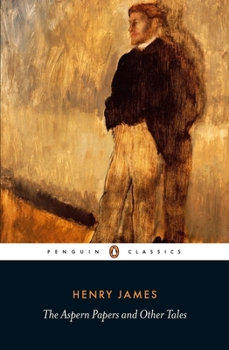The Aspern Papers and Other Stories
Select Format
Select Condition 
Book Overview
An impressive new selection of Henry James's short stories, edited by Pulitzer Prize-nominated James biographer Michael Gorra This volume gathers seven of the very best of Henry James's short stories, all exploring the relationship between art and life. In the title story, "The Aspern Papers," a critic is determined to get his hands on a great poet's papers hidden in a faded Venetian house--no mater what the human cost. "The Author of Beltraffio," "The Lesson of the Master," and "The Figure in the Carpet" all focus on naive young men's unsettling encounters with their literary heroes. In "The Middle Years," a dying novelist begins to glimpse his own potential, while "The Real Thing" and "Greville Fane" explore the tension between artistic and commercial success. These fables of the creative life reveal James at his ironic, provocative best. For more than seventy years, Penguin has been the leading publisher of classic literature in the English-speaking world. With more than 1,700 titles, Penguin Classics represents a global bookshelf of the best works throughout history and across genres and disciplines. Readers trust the series to provide authoritative texts enhanced by introductions and notes by distinguished scholars and contemporary authors, as well as up-to-date translations by award-winning translators.
Format:Paperback
Language:English
ISBN:0141389796
ISBN13:9780141389790
Release Date:February 2015
Publisher:Penguin Classics
Length:384 Pages
Weight:0.66 lbs.
Dimensions:0.9" x 5.2" x 7.6"
Age Range:18 years and up
Grade Range:Grade 12 and higher
Customer Reviews
5 ratings
One of the Master's Very Best
Published by Thriftbooks.com User , 18 years ago
"The Aspern Papers" is one of Henry James's very best works, which makes it one of the best works in all of American literature. A lovely, slightly Gothic, highly evocative novella, it floats along on James's prose like a gondola upon one of Venice's less trafficked canals. It should be as well-known as "Daisy Miller" or "The Portrait of a Lady." Back in the day (that means the 1990's, to all you tragically unhip), this would've made a great Merchant-Ivory movie.
Civilization and Its Discontents
Published by Thriftbooks.com User , 19 years ago
The Aspern Papers is a brilliant story that concentrates everything great about Henry James in one brisk addictive read. James had such a deep feeling for the ornate social niceties of his day that he was able to poke fun of them while still respecting their essential decency--he seemed to understand the greed and brutality they kept in check. Our unnamed narrator's quest to outfox a great poet's elderly mistress and lay ahold of her onetime lover's papers unfolds in a languid world of gondolas, decaying Venetian palazzos, hot evenings in overgrown gardens, and above all a comfortable leisure that allows the smallest social gestures to take on earth-shaking significance. James had an uncanny ability to make that world come alive, bringing you into its subtleties and rites, while at the same time taking you behind the elegant façade to expose the aggression, cupidity, and naked power politics that lurk just beneath the impeccable manners. Our narrator wants the papers; the mistress wants money for her niece, and the niece ... well, order this book and read on to find out. You won't be disappointed--it's one of James's best.
Brilliant and also heartbreaking
Published by Thriftbooks.com User , 25 years ago
The title novella here is one of the finest examples of the entire genre. The questions underlying the narrator's intended crime (such as the problems of literary propriety, the "hauntedness" scholars feel from their literary subjects) are exquisitely handled... yet even so this story wouldn't be nearly so memorable if its expert treatment of Miss Tina's anguish weren't rendered so vividly. Her confession scene ("I can't go on... I'm too ashamed!") is one of the most moving things James ever wrote, equalled only by her strange surmounting of that anguish later in the book and by the narrator's rueful closing words.
Intense story about a manipulative publisher
Published by Thriftbooks.com User , 25 years ago
This is a fascinating, somewhat mystifying story about an American publisher who wants findsome long lost papers of an almost forgetten poet Jeffrey Aspern. The narrator finds his long ago mistress living in poverty in Venice. The reader is not only treated to this rather mysterious tale about the mistress Juliana Bordereau and her equally strange niece,Tina, but to a wonderful picture of l9th centurey Venice. The narrator behaves in a hypocritcal fashion, tryimg to get the papers of Aspern away from these two women. Henry James is his usual rather verbose mode of writing,but I found the book's tale pushing me to the end. [email protected]
James at His Most Modern
Published by Thriftbooks.com User , 25 years ago
"The Aspern Papers" asks the question: to what extent should private information be made public and for what reason? James' book concerns the triple manipulations of people who have or want access to the private love letters written by a famous 19th century poet, Jeffrey Aspern. The sperned lover, an antique American named Juliana, has her reasons for keeping and for selling the letters (if they exist at all). A greedy and unnamed young journalist wishes to build his career on the exposure of Juliana's love affair to the Jeffrey Aspern. A spinster, Juliana's niece who shares Juliana's villa in Venice, is the "price" for the sale of the letters. Add to this the "ghost" of Jeffrey Aspern, who seems to be present around every corner, and what James has produced is a suspenseful tale of warped values, shady dealings, and the corruption of "the innocents". James' language and style may at first be daunting, but "The Aspern Papers" is a wonderful introduction to a great American writer who knew first-hand the power of psychology.





